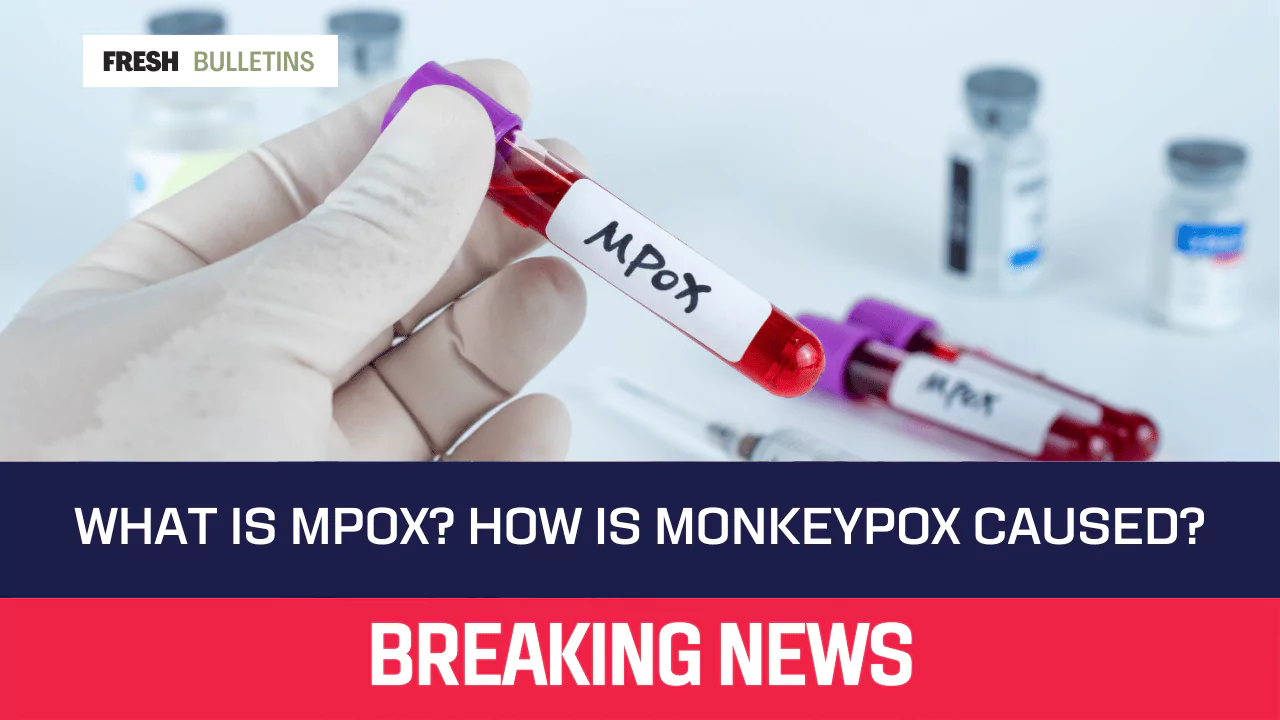What is Mpox? How is Monkeypox Caused?
You might wonder what Mpox is all about. It’s a sickness that comes from the monkeypox virus. This article will teach you how it spreads and ways to stay safe.
What is Mpox or Monkeypox?
Mpox, or Monkeypox, is a viral infection that belongs to the orthopoxvirus group. The illness shares similarities with smallpox but is less severe. The virus primarily occurs in remote parts of Central and West Africa and can spread from animals to humans, leading to outbreaks among people.
Definition and Origins
Mpox, once known as monkeypox, is an illness caused by the mpox virus. This virus comes from animals and can spread to people. It was first found in 1970 in central and west Africa.
The disease got its name because scientists first found the virus in monkeys kept for research.
The World Health Organization (WHO) now prefers to call it “mpox.” They made this change after talking with experts around the world.
Mpox is a global concern that requires immediate attention and action, said officials from the WHO.
Types of the Monkeypox Virus
There are two main kinds of the monkeypox virus, known as clade I and clade II. Clade I leads to a worse sickness and more deaths than Clade II in places where the disease often occurs.
In 2022, a big outbreak happened because of clade II. This made many people sick around the world.
In 2023, scientists found a new kind called clade Ib in the Democratic Republic of the Congo. It’s different from the other two types but still makes people very sick. Knowing these types helps doctors fight the disease better.
Causes and Transmission of Monkeypox
Monkeypox is caused by infection with the monkeypox virus, which belongs to the orthopoxvirus genus. The virus can be transmitted to humans through close contact with infected animals or humans and via respiratory droplets.
Infection with the Monkeypox Virus
Getting monkeypox happens when a person picks up the virus from another person, an animal, or a surface carrying the virus. This virus is tricky and can jump from animals to humans in places where they live close to wild animals that carry it.
Once someone has it, they can pass it on through skin-to-skin contact or by touching things like clothes or bed sheets that have the virus on them.
Monkeypox spreads through close touch, making prevention key.
Modes of Transmission
Monkeypox can spread through:
- Close Personal Contact:
- Skin-to-skin contact
- Mouth-to-mouth contact
- Respiratory droplets
- Sexual Transmission:
- During the 2022 global outbreak, monkeypox transmission was largely associated with sexual contact.
- Animal-to-Human Transmission:
- Physical contact with infected animals
- Bites and scratches from infected animals
- Handling infected animal meat
Symptoms and Treatment of Monkeypox
Monkeypox symptoms typically include fever, headache, muscle aches, and backache. The rash usually starts on the face and then spreads to other parts of the body. Available treatments for monkeypox focus on managing symptoms and providing supportive care alongside antiviral medications when necessary.
Incubation Period and Early Symptoms
The incubation period for Monkeypox ranges from 5 to 21 days. Early symptoms include fever, headache, muscle aches, and exhaustion. Swollen lymph nodes are also common. The disease’s severity varies widely, from mild symptoms to serious ones requiring medical attention.
In severe cases, individuals may experience rectal inflammation (proctitis) and genital inflammation affecting urination.
During the incubation period of Monkeypox—typically lasting between 5 to 21 days—the infected person usually doesn’t display any symptoms before becoming ill with fever, headache, muscle aches, and exhaustion.
Alongside these flu-like symptoms are swollen lymph nodes which often signal early stages of the disease. Middle-aged adults appear more susceptible as they’re seen experiencing complications related to this virus including secondary bacterial infections – CDC.
Available Treatments
Monkeypox is a viral disease that can cause symptoms like fever, headache, muscle aches, and exhaustion. It’s essential to get proper treatment if you show signs of the virus.
- Tecovirimat was recently approved in January 2022 by the European Medicines Agency for treating monkeypox under exceptional circumstances. This drug was initially developed for smallpox and has shown effectiveness against monkeypox.
- Supportive care is crucial in treating monkeypox cases. While most people recover with supportive care, specific groups face higher risks of severe illness.
- Severe monkeypox can lead to complications like widespread lesions, secondary bacterial infections, lung infections, brain inflammation (encephalitis), and heart inflammation (myocarditis). Early recognition and treatment are vital to prevent these complications.
- Treatment may also involve antiviral drugs aimed at reducing the severity and duration of the illness.
Is There a Vaccine Against Monkeypox?
Vaccines like MVA-BN, LC16, and ACAM2000 are recommended by WHO to prevent monkeypox. They offer protection against infection and severe disease. Immunity develops over several weeks after vaccination.
Who is at Risk of Mpox?
Certain populations are at high risk for Mpox: newborns, children, pregnant individuals, and those with compromised immune systems such as advanced HIV disease. Individuals in close contact with infected persons or handling contaminated materials are also at elevated risk.
Notably, the 2022/2023 outbreak mainly impacted gay, bisexual, and other men who have sex with men. Moreover, those having multiple sexual partners face increased exposure risks and should promptly seek medical attention if symptoms arise.
Prevention and Global Impact
Prevention is key in controlling Monkeypox’s global impact. Understanding how it spreads and promoting vaccination can limit its transmission. To delve deeper into this crucial topic, continue reading the blog.
Importance of Prevention
Preventing Monkeypox is crucial. Cleaning and disinfecting can help. Also, hand hygiene is important. Avoid close contact with infected people, and seek medical advice if symptoms show up.
WHO collaborates with FAO and WOAH to reduce transmission risks by understanding the virus’s natural reservoir.
Recent Outbreaks and Impact on Public Health
Monkeypox has caused significant recent outbreaks, particularly in India and the Democratic Republic of Congo, leading to it being declared a public health emergency by the World Health Organization on August 20, 2024.
The impact has been severe with over 16,700 confirmed or suspected cases and more than 570 deaths reported from the Democratic Republic of Congo alone in 2024. This represents a staggering increase of approximately 160% in new monkeypox cases compared to the previous year.
Worldwide, there have been a total of 99,176 cases and 208 deaths across 116 countries since 2022.
The implications for public health are profound due to the contagious nature of this zoonotic disease and its potential to spread rapidly within communities. The ongoing outbreak raises concerns about controlling infectious diseases and highlights the need for robust preventive measures both locally and globally.
With such alarming statistics impacting various regions around the world, it becomes imperative for international organizations like WHO as well as regional bodies such as African Union’s health agency to prioritize containment efforts while also accelerating research and development initiatives aimed at strengthening disease control mechanisms and healthcare infrastructure.
Future Outlook
The development of novel vaccines and antiviral treatments offers hope in controlling Monkeypox outbreaks. To read more, click on the link below.
Research and Development for Vaccines and Treatments
Research and development for vaccines and treatments for Mpox are ongoing. Studies show that vaccines provide significant protection against Mpox. Ongoing research will enhance understanding of vaccine effectiveness in different settings, and further investigation is needed to comprehend pre-symptomatic and post-healing transmission dynamics.
Why WHO Declared Mpox as a Global Health Emergency?
WHO declared mpox a public health emergency of international concern (PHEIC) on August 20, 2024, due to the rising cases and deaths worldwide. This was crucial as it especially affected children under 15, making a significant impact on public health.
The global spread of mpox posed serious threats, prompting the WHO to make this declaration.
The decision came after careful consideration of the escalating numbers of cases and mortality rates related to mpox disease. These distressing trends emphasized the urgency of addressing and containing the outbreak through coordinated international efforts.
As a result, WHO intervention became imperative in effectively managing this escalating global health crisis caused by mpox.
How Can I Protect Myself and Others Against Mpox?
To protect yourself and others against Mpox:
- Avoid close contact with anyone infected with Mpox, including sexual contact.
- Practice frequent hand hygiene with soap and water or alcohol-based hand rubs.
- Seek medical advice and isolate if you suspect Mpox until evaluated and tested.
- Use condoms for 12 weeks after recovery from Mpox.
I’ve Had Mpox in the Past, Can I Get Infected Again?
If you had mpox before, it’s possible to get it again. Scientists are still studying how long the immunity lasts after an infection. Even if you’ve had mpox in the past, there’s a chance of getting infected again, so be cautious.
Some people who have had mpox before may believe they’re immune and can take care of others, but it’s essential to minimize exposure even though they might have some level of protection.







